 W
WAghasura (अघासुर), is a demon (rakshasa) in Hindu and Vedic scriptures.
 W
WAniruddha or Aniruddh, meaning "unrestrained", "without obstacles" or "unstoppable" was the son of Pradyumna and Rukmavati and the grandson of Krishna and Rukmini. He is said to have been very much like his grandfather, to the extent that he may be a jana avatar, the avatar of Vishnu. The four are considered to be Vishnu-tattva or Vishnu's plenary expansions. It has been also used as one of the names of Lord Shiva.
 W
WArjuna is the main protagonist of the Indian epic Mahabharata and also appears in other ancient Hindu texts. In the epic, he is the third among Pandavas, the five sons of Pandu. He was born when Indra, god of rain, blessed Kunti and Pandu with a son. The family formed part of the royal line of the Kuru Kingdom.
 W
WBalarama is a Hindu god and the elder brother of Krishna. He is particularly significant in the Jagannath tradition, as one of the triad deities. He is also known as Baladeva, Balabhadra, Haladhara, Halayudha, and Sankarshana. The first two epithets refer to his strength, the last two associate him with Hala from his strong associations with farming and farmers, as the deity who used farm equipment as weapons when needed.
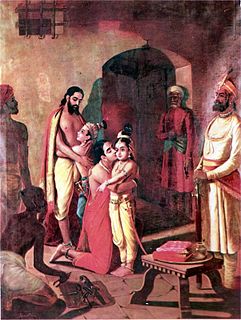 W
WIn Hinduism, Devaki (देवकी) is one of the daughters of Devak. She married Vasudeva and mothered Krishna as specified in the ancient Mahabharata
 W
WAccording to Hindu scriptures, Dhenuka, also known as Dhenukasura, was an rakshasa (demon) killed by Balarama, the elder brother of Krishna.
 W
WDraupadi, also referred as Panchali and Yajnaseni, is the tragic heroine, one of the central characters and the common wife of the Pandavas in the Hindu epic, Mahabharata. She is described to be the most beautiful woman of her time and was prophesied to bring a major change in the future.
 W
WEkanamsha is a Hindu goddesss, identified with Yoganidra a.k.a. Arya. In Sanskrit, Ekanamsha means "the single, portionless one" and it is a name of the new moon. The Indian Theogony: According to S. C. Mukherji, a modern scholar, in the Harivamsa, Ekanamsha is identified as a shakti of Vishnu, she descended as the daughter of Nanda to protect the baby Krishna from Kamsa. In Harivamsa, she is represented as sister of Indra due to which she is also known as Kaushiki. Visnudharmottara purana describes her as Gandhari and this Gandhari represents Lakshmi, Dhrti, Kirti, Pusti, Sraddha, Sarasvati, Gayatri and Kalaratri. She is also considered as Subhadhra the sister of Krishna as worshipped in Jagannath temple Orissa. According to the Harivamsa (II.4.37-41), she was worshipped by the Vrishnis. Many "kinship triads", depicting Vasudeva Krishna, Balarama and their sister Ekanamsha have been found in the Mathura region, which are stylistically dated to the early centuries of the Common era.
 W
WGandhari is a prominent character in the Indian epic the Mahabharata. She was a princess of Gandhara and the wife of Dhritrashtra, the blind king of Hastinapura, and the mother of a hundred sons, the Kauravas.
 W
WGopi (गोपी) is a Sanskrit word originating from the word Gopala referring to a person in charge of a herd of cows. In Hinduism especially, the name Gopika is used more commonly to refer to the group of cowherding girls famous within Vaishnavism for their unconditional devotion (Bhakti) to Krishna as described in the Bhagavata Purana and other Puranic literature. Of this group, one gopika known as Radha holds a place of particularly high reverence and importance in a number of religious traditions, especially within Gaudiya Vaishnavism. In Gaudiya Vaishnavism, there are 108 gopikas of Vrindavan. Although Radha and the other gopis are referred to as "cowherd girls," according to the esoteric theology of Vaishnavism they are the eternal consorts of Krishna, who is the Supreme Personality of Godhead. As such, they are the internal potency, or antaranga shakti, and expansions of the internal potency of the Supreme Godhead.
 W
WIn Hindu tradition, Kamsa was the tyrant ruler of the Vrishni kingdom with its capital at Mathura. He was the cousin of Devaki, the mother of the god Krishna — who slew Kamsa. Kamsa is described as human in early sources and a rakshasa (demon) in the Puranas. His royal house was called Bhoja and another of his names was Bhojapati.
 W
WKarna, also known as Vasusena, Anga-raja, and Radheya, is one of the major characters of the Hindu epic Mahābhārata. He is the spiritual son of the Vedic deity- Surya and princess Kunti, and thus a demigod of royal birth. Kunti was granted the boon to bear a child with desired divine qualities from the gods without her knowledge, later upon learning about the boon, a surprised and worried Kunti invoked the sun god to confirm it if it was true indeed. Karna was secretly born to an unmarried Kunti in her teenage, fearing outrage and backlash from society over her premarital pregnancy, Kunti had no choice but to abandon the newly born Karna adrift in a basket on the Ganges, in the hope that he finds foster parents. The basket discovered and Karna is adopted and raised by foster Suta parents named Radha and Adhiratha Nandana of the charioteer and poet profession working for king Dhritarashtra.
 W
WIn Hindu mythology, Keshi is the horse-demon, killed by Krishna, an avatar of the god Vishnu. The demon was dispatched by Krishna's evil uncle Kamsa, who was destined to die at Krishna's hands.
 W
WKubja is a hunchbacked woman from Mathura, who the Hindu god Krishna is described to have rescued and made beautiful.
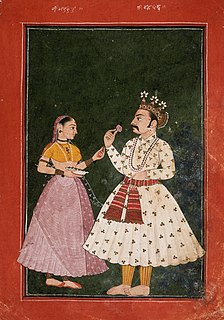 W
WIn the Mahabharata, Kunti or Pritha was the daughter of Shurasena and the foster daughter of his cousin Kuntibhoja. She married Pandu and became the mother of Karna, Yudhishthira, Bhima and Arjuna. She adopted her step sons, Nakula and Sahadeva, and became their foster mother. Her brother was Vasudeva, father of Krishna, Balarama, and Subhadra. She was very beautiful and intelligent. She is often regarded as one of the protagonists of the Mahabharata.
 W
WMeera, also known as Mirabai, was a 16th-century Hindu mystic poet and devotee of Lord Krishna. She is a celebrated Bhakti saint, particularly in the North Indian Hindu tradition.
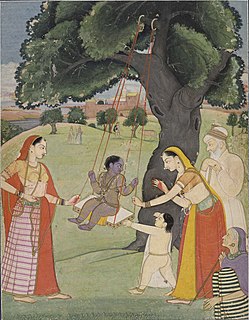 W
WNand, according to the Harivamsha and the Puranas, was the head of the Gopas tribe of Yadava cowherds referred as Holy Gwals. Nanda was a Kshatriya chief. He is popularly known as the foster-father of Krishna.
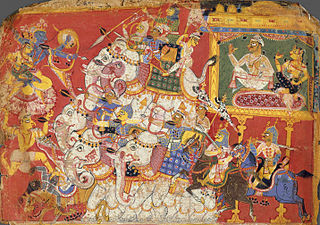 W
WNarakasura was a mythical asura king, the legendary progenitor of all three dynasties of Pragjyotisha-Kamarupa, and the founding ruler of the legendary Bhauma dynasty of Pragjyotisha. Though the myths about Naraka are first mentioned in the Mahabharata, later texts embellish them. According to later post-Vedic texts such as the Brahma Purana and Vishnu Purana, he was the son of Bhudevi, fathered either by the Varaha incarnation of Vishnu or Hiranyaksha. He is claimed as one who established Pragjyotisha. He was killed by Krishna and Satyabhama. His son Bhagadatta—of Mahabharata fame—succeeded him.
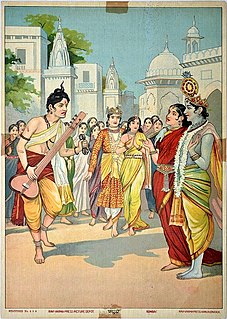 W
WPradyumna is the eldest son of the Hindu deities Krishna and Rukmini. Pradyumna is considered as one of the four vyuha avatars of Vishnu. According to the Bhagavata Purana, Pradyumna was an incarnation of Kamadeva, the god of love, previously burnt by Lord Shiva's anger.
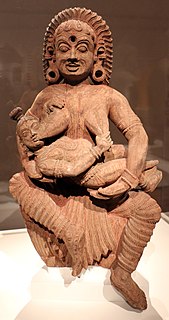 W
WIn Hinduism, Pūtanā is a rakshasi (demoness), who was killed by the infant-god Krishna. Putana disguises as a young, beautiful woman and tries to kill the god by breast-feeding poisoned milk; however Krishna sucks her milk as well as her life via her breasts. Putana is also considered as a foster-mother of Krishna as she breast-fed him. By offering her milk, Putana had performed "the supreme act of maternal devotion", in the shadow of her evil motives. The myth is told and retold in Hindu scriptures and some Indian books, which portray her variously as an evil hag or a demoness who surrendered herself to Krishna, though she initially came with evil motives.
 W
WIn Hinduism, Rohini is the first consort of Vasudeva and mother of the Hindu god Balarama and Subhadra. She played a prominent role in the nurture of Krishna.
 W
WRukmini or Rukmani is a Hindu goddess and the chief queen and eternal consort of Krishna, the king of Dwaraka and the avatar of the god Vishnu. She is described as the avatar of Lakshmi, the consort of Vishnu.
 W
WSamba was a son of Krishna, the Hindu god, and his second consort Jambavati. His half-brother was Pradyumna. His actions, caused by anger, brought an end to the Yadu dynasty. His wife is Lakshmanaa.
 W
WSandīpanī Muni was the guru of Bhagavan Śrī krishna.
 W
WYuyudhana, better known as Satyaki, was a powerful warrior belonging to the Vrishni clan of the Yadavas, to which Krishna also belonged. According to the Puranas, he was the grandson of Shini of the Vrishni clan, and son of Satyaka, after whom he was named. A valiant warrior, Satyaki was devoted to Krishna and was a student of Arjuna.
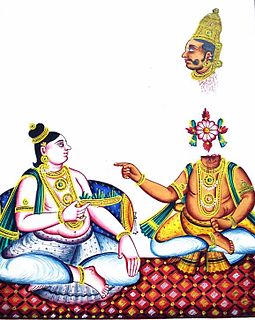 W
WShishupala was the son of Damaghosha after whom descendants to Chedi Kings were named as ghosis a tribe of Yadavas in Chedi, by Srutashrava, sister of Vasudeva, Kunti and cousin of Nanda Baba. He was slain by Krishna, his cousin and an avatar of Vishnu, at the great coronation ceremony of Yudhishthira in punishment for the opprobrious abuse made against his august personage. He was also called Chaidya, being a member of Chedi kingdom.
 W
WShurasena was an ancient Yadava ruler of Mathura. He was married to a Naga, or serpent, woman named Marisha. She bore all of his children, and was the cause for Vasuki’s boon to Bhima. after whom the Surasena Kingdom or mahajanpada and the Yadava sect of Surasenas were named.
 W
WSubhadra is an important character in the epic Mahabharata and also appears in other ancient Hindu scriptures. In the epic, she is the sister of Krishna and Balarama, wife of Arjuna, mother of Abhimanyu and grandmother of Parikshit. She is the daughter of Vasudeva and his first wife Rohini. Subhadra is known as Veera sodari, Veera Patni and Veera mata due to her relationship with Krishna, Arjuna and Abhimanyu respectively. Subhadra is one of the three deities worshipped at the Jagannath temple at Puri, along with Krishna and Balarama. One of the chariots in the annual Ratha Yatra is dedicated to her.
 W
WSudama was a childhood friend of Hindu deity Krishna from Mathura, the story of whose visit to Dwaraka to meet Krishna is mentioned in the Bhagavata Purana. He was born as a poor man in order to enjoy the transcendental pastimes.
 W
WUgrasena is a Yadava king in Mahabharata epic. He was the king of Mathura, a kingdom that was established by the powerful Vrishni tribes from Yaduvanshi clan. Lord Krishna was the grandson of Ugrasena. He established his grandfather as the ruler of Mathura again after defeating his uncle, King Kansa who was a wicked ruler. Before this, King Ugrasena was overthrown from power by his own son Kansa and was sentenced to prison along with his daughter Devaki and son in law Vasudeva to prison. Devki and Vasudev were parents of Lord Krishna.
 W
WUṣā or Usha was a daughter of the asura king Banasura and wife of Annirudha, grandson of Lord Krishna.
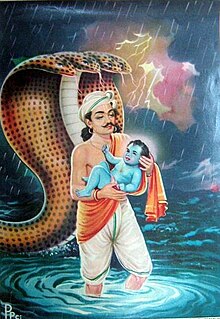 W
WAccording to Hindu scripture, Vasudeva, also called Ānakadundubhii, is the father of the Hindu deities Krishna, Balarama and Subhadra. He was king of the Vrishnis and a Yadava prince. He was the son of the Yadava king Shurasena. His sister Kunti was married to Pandu. Kunti plays a big role later in the war Mahabharata.
 W
WIn Hindu legends, Yashoda, also spelt as Yasodha, is the foster-mother of Lord Krishna and wife of Nanda. She is described in the Puranic texts of Hinduism. According to Bhagavata Purana, Krishna was born to Devaki, but Krishna's father Vasudeva brought the newborn Krishna to Nanda Baba in Gokul, in order to raise and protect Krishna from Devaki's brother Kansa, the king of Mathura. The name Yashoda means 'one who is giver of Fame '.